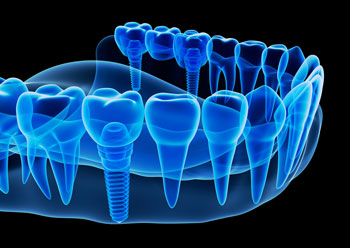 Dental implant procedures improve your quality of life after tooth extractions. They give you your teeth back so you can continue to eat and drink normally. Moreover, they’re aesthetically appealing so they enhance your looks, leaving you feeling better about yourself.
Dental implant procedures improve your quality of life after tooth extractions. They give you your teeth back so you can continue to eat and drink normally. Moreover, they’re aesthetically appealing so they enhance your looks, leaving you feeling better about yourself.
Dental implants are titanium screws that are inserted into the jawbone. These implants secure artificial teeth in place and prevent bone resorption in people with little to no teeth.
Without a dental implant bone resorption could occur following a tooth extraction. Since the jaw bone doesn’t receive the stimulation it needs, it starts to melt away or degenerate. Once fused to the jawbone, the implant stimulates the alveolar bone like regular teeth do, and this prevents resorption and functional problems.
Depending on the location and number of teeth missing, the dentist will determine the number of implants required. “All on 4 dental implants” are beneficial to those who have removed all their teeth in the top or bottom jaw. They support an entire set of teeth through the surgical insertion of either 2 or 4 implants.
Are You a Candidate for a Dental Implant Procedure?
Generally speaking, anyone who has had their teeth removed can choose to undergo dental implant surgery. However, since the surgery carries a few risks and the treatment lasts for at least one year, the dentist will pre-screen you to find out if dental implant surgery is right for you.
People suffering from high diabetes or auto-immune disorders are risky candidates because these conditions preclude quick healing and in some instances they can cause infections at the surgical site. Patients undergoing treatment for cancer are also not ideal candidates for this surgery because their immune systems are weakened by the illness and intake of chemotherapy medicines. Such patients can consider using dentures until they get strong enough to undergo dental implant surgery.
In other instances, patients suffering from oral problems like periodontal disease are asked to refrain from undergoing dental implant surgery until the disease has been cured. If you want to undergo dental implant therapy, you will also have to be prepared to give up smoking for the entire duration of the treatment (usually 6-12 months).
If you have already suffered from mild bone loss, your oral surgeon may suggest bone grafting surgery as an option for you. Some surgeons use materials to re-grow the bone while others graft a bone taken from another part of the body.
Dental implant procedures require a lot of precision and expertise. The dentist will use 3D x-rays and scans to determine the condition of your bone and teeth. The surgery can be performed under general anaesthesia and it has a high rate of success.
Risks Associated with Dental Implant Surgery
As with many other surgical procedures, there always remains the risk of delayed healing, nerve damage, excessive bleeding and infection at the affected site. If you’re concerned about these risks, it’s important to openly discuss the pros and cons of undergoing the surgery with a professional dental practitioner.
If you have queries regarding dental implant surgery, get on the phone with our experienced staff at Randwick Dental Clinic. We offer you high-quality dental products at reasonable prices. We also accept seniors and age pensioner cards for all prosthetic treatments.
Call (02) 9314 5226 or book an appointment online.
 Randwick
Randwick